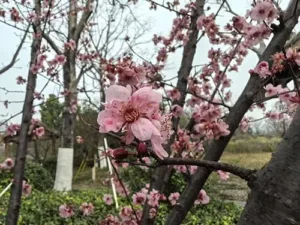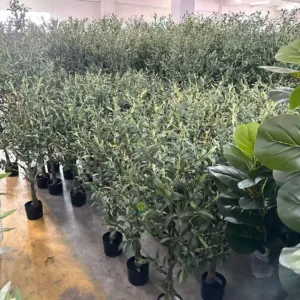As we well know , artificial plants have surged in popularity, becoming a staple in modern interior design. This trend is driven by the desire for low-maintenance greenery that adds aesthetic appeal without the demands of real plants. Among these, the artificial Ficus lyrata tree, also called fiddle-leaf fig, stands out as a favorite. Known for its large, glossy leaves and striking presence, the Ficus lyrata brings a touch of elegance and sophistication to any space. Its lifelike appearance and versatility make it an ideal choice for those looking to enhance their decor with minimal effort.

History of Ficus Lyrata
The Ficus lyrata, commonly known as the fiddle-leaf fig, is native to the tropical rainforests of Western Africa, from Cameroon to Sierra Leone. This striking plant was first scientifically described in the late 19th century and has since captivated botanists and plant enthusiasts alike.
Its journey from the wild to becoming a beloved houseplant began in the mid-20th century when it was introduced to Western horticulture. The Ficus lyrata quickly gained popularity due to its dramatic, violin-shaped leaves and towering presence, which make it a standout piece in any interior setting. Its ability to thrive in indoor environments with proper care contributed to its widespread adoption.
The rise of minimalist and modern interior design further cemented the Ficus lyrata’s status as a household favorite. Its bold foliage and architectural form complement contemporary decor styles, making it a natural choice for designers and plant lovers seeking a statement piece. Today, the Ficus lyrata continues to be celebrated for its aesthetic appeal and versatility, making it a staple in homes and offices around the world.
Why are fiddle leaf figs so hard to care for?
Ficus lyrata, while stunning, can be somewhat challenging to care for, especially for those new to houseplants. They require specific conditions to thrive:
1. Light Requirements: Fiddle-leaf figs need bright, indirect light. They can tolerate some direct sunlight but too much can scorch their leaves.
2. Watering: They prefer a consistent watering schedule, allowing the top inch of soil to dry out between waterings. Overwatering can lead to root rot, while underwatering can cause leaf drop.
3. Humidity: As tropical plants, they thrive in higher humidity. Dry indoor air, especially during winter, can lead to brown leaf edges.
4. Temperature: They prefer stable temperatures between 60-75°F (15-24°C). Drafts, sudden temperature changes, and cold conditions can stress the plant.
5. Soil and Fertilization: Well-draining soil is essential. They benefit from monthly feeding with a balanced fertilizer during the growing season (spring and summer).
Despite these care requirements, many plant enthusiasts find the effort worthwhile for the beauty and statement-making presence that a healthy Ficus lyrata provides. For those who find the care too demanding, artificial Ficus lyrata trees offer a maintenance-free alternative with the same visual impact.

Advantage of Artificial Ficus Lyrata Tree
An artificial Ficus lyrata tree offers the beauty and elegance of the real plant without the demanding care requirements. Perfect for those with busy lifestyles or less-than-ideal growing conditions, these realistic replicas provide year-round greenery without needing sunlight, water, or special attention. They are durable, allergen-free, and versatile, making them an ideal choice for adding a touch of nature to any space effortlessly.

How to choose the right Artificial Ficus Lyrata Tree
Choosing the right artificial Ficus lyrata tree involves considering several key factors to ensure you get a realistic and high-quality plant. Here’s 5 guides to help you make the best choice:
1.Quality of Materials
• Leaves: Look for trees with leaves made from silk or high-quality plastic. These materials can mimic the texture and glossiness of real Ficus lyrata leaves.
• Trunk: Opt for trees with a natural-looking trunk, often made from real wood or a realistic synthetic material.
2.Realism
• Color Variations: A good artificial tree will have leaves with subtle color variations, mimicking the natural patterns found in real fiddle-leaf fig leaves.
• Details: Check for detailed veining and texture on the leaves. Realistic plants will have intricate details that add to their authenticity.
3.Size of Artificial Ficus Lyrata Tree and Proportions
• Height: Measure the space where you plan to place the tree. Artificial Ficus lyrata trees come in various heights, from small tabletop versions to large floor-standing trees.
• Leaf Density: Ensure the tree has a dense arrangement of leaves, which contributes to a fuller and more natural appearance.
4.Placement and Versatility
• Base and Pot: Consider the base or pot that comes with the tree. A stable and attractive base enhances the overall look. You might also want a tree that allows you to change the pot to match your decor.
• Flexibility: Some artificial trees have adjustable branches, allowing you to shape them to fit your space better.
5.Price and Value
• Budget: Determine your budget beforehand. Higher-quality artificial trees can be more expensive, but they often look more realistic and last longer.
• Comparison: Compare different brands and retailers. Reading reviews can provide insights into the quality and durability of the tree.

Where to buy artificial Ficus lyrata Tree
1.Home Improvement Stores
• Home Depot: Carries a variety of artificial plants, including larger trees like the Ficus lyrata. Ideal for those who prefer to see the product in person before purchasing.
• Lowe’s: Similar to Home Depot, Lowe’s offers a selection of artificial plants and trees that can be viewed in-store or online.
2.Furniture and Home Decor Stores
• IKEA: Known for affordable and stylish home decor, IKEA offers artificial plants that can fit modern and minimalist aesthetics.
• Pottery Barn: Offers high-quality, realistic artificial plants, including the Ficus lyrata, often in stylish pots.
• West Elm: Carries a curated selection of artificial plants that blend well with contemporary decor styles.
3.Online Retailers
• Amazon: Offers a wide variety of artificial Ficus lyrata trees in different sizes and price ranges. Customer reviews can help gauge quality.
• Wayfair: Known for a vast selection of home decor items, including realistic artificial plants. They often have sales and discounts.
• Overstock: Provides a good selection of artificial plants, including the Ficus lyrata, often at competitive prices.
• Etsy: Great for finding unique and handcrafted options. Some sellers offer custom-made artificial plants.
4.Specialty Stores
• Nearly Natural: Specializes in artificial plants and flowers, offering high-quality, realistic options. Their products are designed to mimic the real thing closely.
• Silk Plants Direct: Offers a wide range of artificial plants, including Ficus lyrata, with a focus on realistic appearance and durability.
• Plantifya: Chinese supplier for all kinds of artificial plants with high-quality and competitive price to meet customer’s demand.




